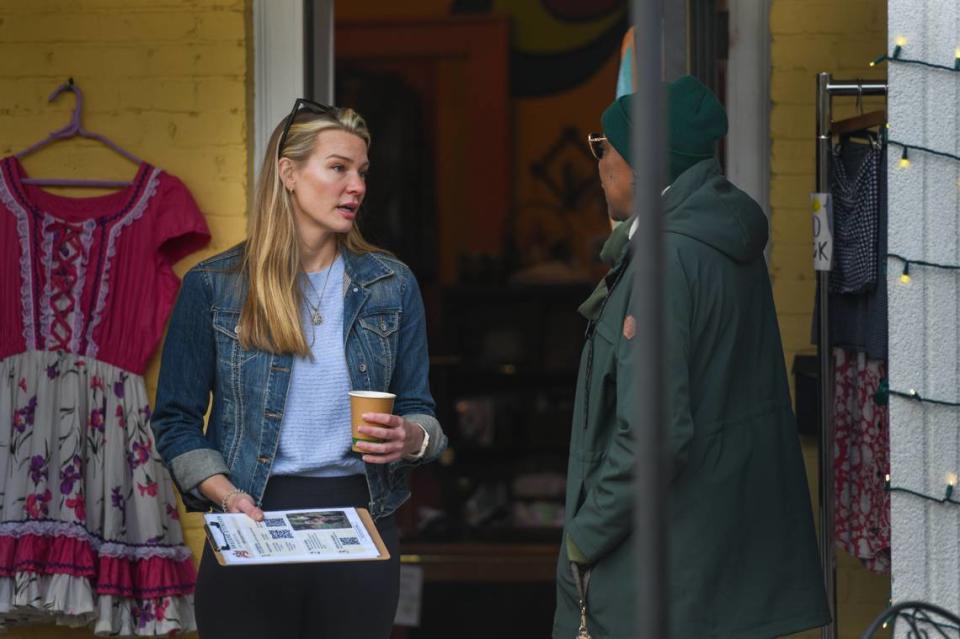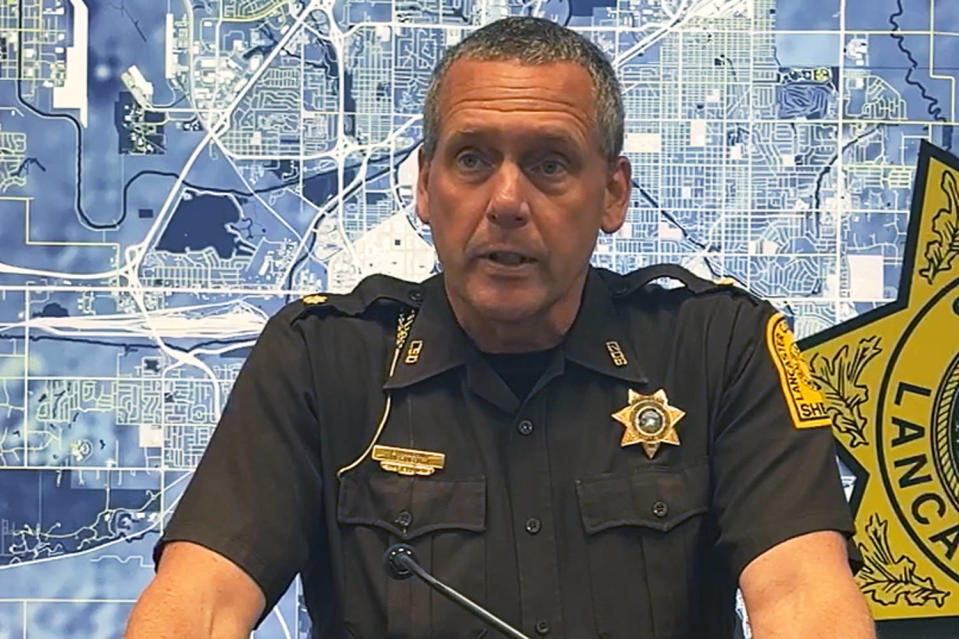When state lawmakers redrew North Carolina’s 14 congressional districts and candidates announced their bids, it looked like the state’s 9th district would feature a familiar narrative: A two-way race between a Republican running in a district drawn to favor his party, and a Democrat with little chance.
Then came Shelane Etchison.
Etchison decided to take a chance and run as an unaffiliated candidate. She is the first congressional candidate in modern North Carolina history to make it on the ballot as an unaffiliated candidate, according to Chris Cooper, political science professor at Western Carolina University.
“I want to remind people, that the options that we’ve been given, what we’ve been told right now — that it’s just two parties, and that’s the only way it’ll ever be — there’s no basis for that in our Constitution,” Etchison said. “And there’s no basis that that’s how it has to be going forward.”
The 9th Congressional District stretches up the center of the state and encompasses Alamance, Hoke, Moore, Randolph and parts of Chatham, Cumberland and Guilford counties. It is home to Fort Liberty, formerly known as Fort Bragg; a large base that employs 52,000 military personnel.
And it’s how Etchison, a Florida native, came to call North Carolina home.
Fort Liberty
Etchison first came to North Carolina in 2011 while serving in the Army, having been stationed at Fort Liberty.
“I very quickly just made this my adopted home,” Etchison said. “I’ve never wanted to live elsewhere.”
She added that that’s a path shared by many within the district.
“I’m a veteran,” Etchison said. “I think we’re a pretty tight-knit community, and those bonds and relationships forged in the military are really difficult to replicate elsewhere.”
Military career
Etchison has a storied career in the Army.
She joined the military after watching the 9/11 attacks unfold.
“I don’t come from a military family,” Etchison said. “But I just had this ache in my heart, in my belly, that I needed to serve in some capacity.”
Etchison joined the military at a time when women weren’t allowed in combat, but became one of the first women selected for a combat mission with Army Rangers to Afghanistan. She was also one of the first women fighting in Syria, where she embedded with Kurdish women fighting the Islamic State group.
Etchison said that led her to be a leader, and part of that leadership was selfless service and commitment to something bigger than herself.
“So much of my time in the military — in Iraq, Afghanistan and Syria — there’s no way you go through those experiences without having deep gratitude for our country and the ideals that it stands for,” Etchison said. “And I decided I need to run for Congress, because our country’s hurting. And there’s a dearth of leadership right now in Congress, (with lawmakers) who are not putting the needs of our country and people first, and are more concerned about party politics, partisanship and theatrics.”
She includes her Republican opponent, Rep. Richard Hudson, on that list.
Etchison said the same pull she felt to do something after 9/11, she feels now about serving in Congress. She said as a member of Congress she wants to bring back civility and true leadership principles. She wants to get away from division and sowing fear and blame.
“When we have the unfortunate example of our leaders in Congress playing into theatrics and partisan games, it almost gives permission to the American people to sort of behave that same way,” Etchison said.
Being unaffiliated
Getting on the ballot was an uphill battle for Etchison. Unaffiliated candidates can’t just sign up like Democrats and Republicans.
To get on the ballot, Etchison had to get 7,460 residents from her district to sign a petition, have the signatures of each voter verified by local boards of elections and then confirmed by the state board of election.

She was the first to pull that off in modern times, Cooper said, and she did it in less than two months.
“It is truly impressive,” Cooper said. “To me, it is a singular feat that she has done this. I think there are functions of running for office, other than just winning, and so she may very well be performing a positive function for democracy by giving people a choice, even though her odds of winning are very, very very, low.”
Cooper looked at data dating back to 1978, when unaffiliated became a category on the ballot, and confirmed there weren’t any previous congressional candidates in that category. He then looked back as far back as he could go.
“Now, was there an independent candidate in 1895 or something?” Cooper said. “Maybe? I haven’t been able to find anybody.”
Etchison was registered as a Republican in Florida, according to a background check through LexisNexis, but is currently registered as unaffiliated in North Carolina. She’s only voted once in the state, this past March, when she asked for the Republican ballot, according to North Carolina State Board of Elections records.
But Etchison said the country’s problems are more nuanced than prescribing it a Republican or Democratic solution. She said that’s part of the reason she chose to run as an unaffiliated candidate.
“I’m proud to be a centrist and a critical thinker who understands that there’s applications and good and bad ideas that come from both sides,” Etchison said. “And I believe that we need more independent thinkers in our halls of Congress and in our legislative bodies.”
Etchison added that there’s a supply and demand problem when it comes to candidates like her. The unaffiliated voter makes up the largest share of North Carolina’s electorate. However, only 3% of candidates have been unaffiliated in the past 10 years, and most of those have been in local races.
“The system right now stifles a lot of competition and stifles the ability for people like me to get on the ballot,” Etchison said.
Cooper agreed.
“The system is set up to make it harder for unaffiliated and third-party candidates to get on the ballot,” Cooper said. “There is no question that it is easier to be on the ballot if you are of the two major parties.”
He said both parties agree that they don’t want to let anyone else in. And he said that its ingrained in society from the way the media covers elections to the way elections are administered to favor a two-party system.
But he added that the more people who can get on the ballot like Etchison did, the easier it becomes for everyone else.
Etchison said that she also chose to run as unaffiliated because of the North Carolina legislature’s penchant for politically gerrymandering the state, currently making it nearly impossible for Democrats to win.
North Carolina is represented in Congress by seven Republicans and seven Democrats. But state lawmakers, led by majority Republicans, were allowed to redraw the districts going into the 2024 election. They gave their party easy wins in 10 districts and left Democrats with just three. The final district is the state’s only true swing seat and is made up of the state’s most far northeastern counties.
“If I had wanted to run as a Democrat, there’s no conceivable pathway to victory,” Etchison said. “So the independent decision was really a performance and ideological one. We have to start doing something different. And then also strategic, if you will, with gerrymandering.”
It’s not easy being unaffiliated. How an NC candidate made it on the ballot
Caucusing
Asked which party Etchison would caucus with, she didn’t have an answer.
She said if she does join a party caucus, “it will be to give me the most leverage of ability to best serve the people in this district.”
“That might be with whoever’s in the majority of at the time.”
Currently, Republicans hold a slim majority in the U.S. House. There are 217 Republicans, 213 Democrats and five vacancies. Last week, Vince Foy, a California Republican, was elected to replace former House Speaker Kevin McCarthy, who retired after being ousted from his leadership position. Foy is expected to be sworn in shortly, bringing the total number of Republicans to 218.
Republicans have had a hard time functioning in the House this session because of the slim majority, often dysfunctional and deadlocked, unable to move legislation forward.
“There’s the problem of independent candidates or unaffiliated candidates getting on the ballot, and then when they do there’s also the problem of what they do when they’re in office,” Cooper said. “Parties don’t just structure voters’ choices, parties also structure Congress, so to try to exist outside of that system is very difficult and would make it very hard for somebody to exert power.”
Etchison said she’s not disillusioned by what’s happening in Congress.
“I will absolutely do the best that I can within the power that I’m able to,” Etchison said. “I think that as an independent, my hope would be that I would be able to bridge divides between both Republicans and Democrats.”
She hopes to unite lawmakers to reach a consensus and work together.
She added that she would not turn her back on the things she values or cares about.
Policy focus
Among those values are making elections more fair and representative of the people.
“I wouldn’t have to be running as an independent if we would be electing candidates who are more moderate and representative and have fair competition in our democracy, so I really want to prioritize going to the root of some of those problems,” Etchison said.
Including, she said, championing legislation to advocate at the federal level for independent redistricting commissions.
She added that partisan gerrymandering isn’t just a Republican problem. Prior to Republicans taking the majority, North Carolina saw partisan gerrymandering under Democratic control.
She also wants to limit corporate money within the elections.
But Etchison said she also wants to get at the heart of what’s hurting Americans, whether it’s their emotional or financial needs.
She hopes to add more protections on social media use.
She wants to incentivize national service coming from the military.
“I’ve seen firsthand what happens when you take people outside of their bubble,” Etchison said. “Put them in a new place, with new people from different cultures, different backgrounds, and we work cohesively together for a shared goal and that does beautiful things that I think will be really helpful for getting people more united again.”
She’s also concerned about Social Security and its availability to younger generations.
Campaigning
But for now Etchison has to work to convince voters that she would represent them better than Hudson, or Democratic candidate Nigel Bristow, in Congress.
Etchison said having to gather signatures allowed her to talk to many people in her district and really learn and understand their needs. And she said as an independent she won’t be beholden to party politics.
Hudson, a six-term congressman, leads the House Republicans’ campaign arm. As the chairman of the National Republican Congressional Committee, Hudson oversees ensuring that Republicans maintain their current seats and secure new ones.
“He’s a big player in Congress,” Cooper said. “He’s somebody whose opinion matters. And he’s going to be able to make a good case that when he’s in office, the district has a fairly large voice.”
Signup bonus from





